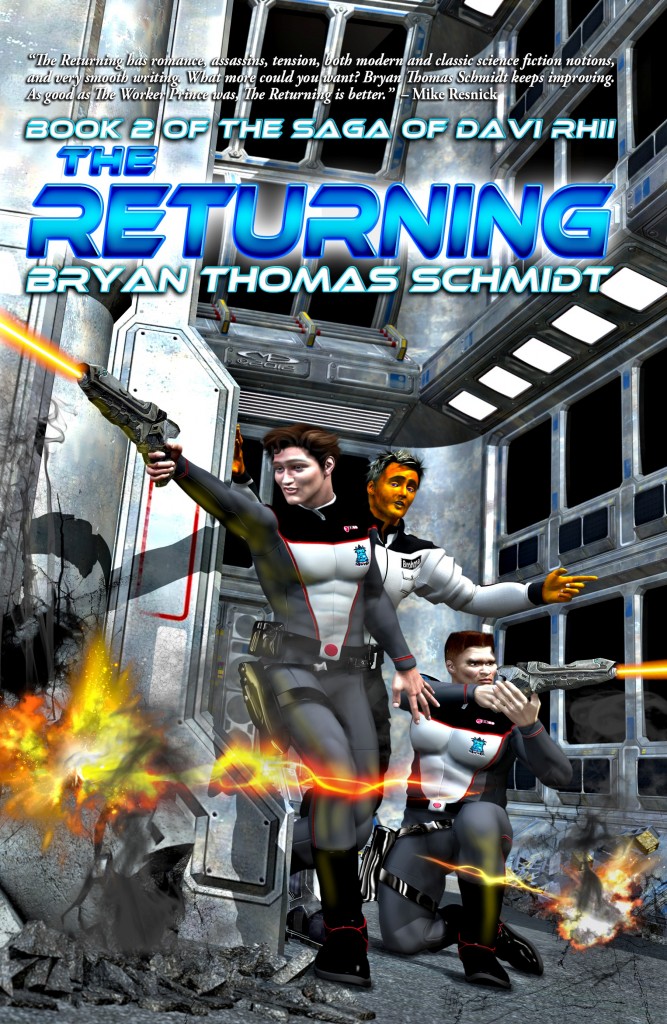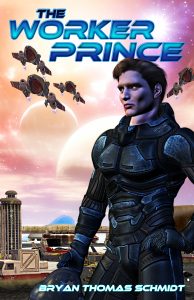 Although I am an editor myself, my publisher rightly and smartly assigns me editors for my books. The Founding Fathers built checks and balances into our government for a reason and, for similar reasons, they are invaluable in the editorial process. Bet you had no idea editing is so patriotic? Recently the editor who edits my Davi Rhii novels, Randy Streu, and I were discussing some editorial pet peeves. And I decided to do a series of these dialogues here which some of you may find helpful. This is the first. Others will follow as they come up. In this case, we’re discussing the annoyance of two overused cheats. One a phrase, the other a single word, used interchangeably for similar affect: “Suddenly” and “all of a sudden” in fiction. Let’s explain by example:
Although I am an editor myself, my publisher rightly and smartly assigns me editors for my books. The Founding Fathers built checks and balances into our government for a reason and, for similar reasons, they are invaluable in the editorial process. Bet you had no idea editing is so patriotic? Recently the editor who edits my Davi Rhii novels, Randy Streu, and I were discussing some editorial pet peeves. And I decided to do a series of these dialogues here which some of you may find helpful. This is the first. Others will follow as they come up. In this case, we’re discussing the annoyance of two overused cheats. One a phrase, the other a single word, used interchangeably for similar affect: “Suddenly” and “all of a sudden” in fiction. Let’s explain by example:
BTS: All of a sudden, Randy’s here.
Randy: Don’t start.
BTS: Sorry, I couldn’t resist. Welcome to the blog.
Randy: Thanks.
BTS: So, we were talking about editorial pet peeves and one of them is the use of “all of a sudden” and “suddenly” for dramatic impact, when they usually and ironically have the exact opposite effect.
Randy: Exactly. If you want drama, make it so.
BTS: All of a sudden, I feel like Commander Riker.
Randy: See? That usage feels natural, in dialogue, at least, because people say that: “All of a sudden, there you were. Suddenly, she appeared.”
BTS: Okay, so when doesn’t it work?
Randy: Pretty much anywhere else, but especially in narration.
An explosion knocked us from our feet mid-conversation as a 747 hit the houses behind us and set Randy’s hair on fire. We hadn’t even known the plane was there. I was unscathed, not a hair out of place, which annoyed him. “Nice hairspray,” he commented. “Thanks. Got it at the dollar store,” I replied.
Randy: Okay, that’s silly and ridiculous, but it works.
BTS: Because it’s unexpected.
Randy: Exactly.
BTS: And thus, it really comes on suddenly in effect and captures the intended dramatic impact rather than being slowed down by the words “all of a sudden” or “suddenly.” Because by the time you get to “sudden” or “ly,” whatever you’re describing is expected. You’ve foreshadowed it with a bullhorn, in effect.
So how should you do it? If you want to surprise your readers in a way that feels sudden, then don’t announce it, just make it happen.
Here’s an example from my second published novel, The Returning, which comes out June 19th. It’s the scene depicted on the book’s cover, in fact:
 “All right, what’s the plan?” Farien turned and joined Yao, looking at Davi as they rang the bell at the tower where Lord Niger kept a ground floor apartment. Amidst an elite grouping of residential high rises near the city center, the twin suns glinted off its shiny exterior, lending it a glow. “Home to the rich and mighty,” it seemed to say. Today one of their number would fall.
“All right, what’s the plan?” Farien turned and joined Yao, looking at Davi as they rang the bell at the tower where Lord Niger kept a ground floor apartment. Amidst an elite grouping of residential high rises near the city center, the twin suns glinted off its shiny exterior, lending it a glow. “Home to the rich and mighty,” it seemed to say. Today one of their number would fall.
“He’s not gonna like this,” Yao said.
“He should have considered that before he betrayed our people,” Davi said as the door slid open to reveal a dark-skinned woman with her hair up. Her eyebrows rose in a question mark as she stared at them with concern.
“We’re here to see Lord Niger,” Yao said.
“My Niger’s in his study and can’t be disturbed right now,” the woman replied, Davi searched his mind for her name—Abena, if he remembered right.
“I’m afraid he’ll have to be,” Davi said, extending his datapad.
Abena’s expression changed to confusion. “What’s this? A warrant?”
“It’s from the Palace, ma’am,” Yao said. “I’m afraid we really need to speak with your husband right away.”
She scowled, shaking her head and stepping back inside, ripping the datapad from Davi’s hand as she did. The door slid shut.
“Great! That was perfect!” Farien rolled his eyes.
“You would’ve done better?” Davi shot him a look.
Farien guffawed. “I always do better, Rhii. I think you’ve forgotten some of your diplomatic skills since you got demoted from Princehood.”
Yao chuckled as Davi made a face. Then the wall beside them exploded in a shower of crumpled steel, broken glass and smoky dust. All three ducked and reached for their blasters, spinning around as their eyes panned for the cause of the blast.
Okay let’s break this down. Davi, Farien and Yao arrive at a wealthy neighborhood to bring a member of the ruling Council in for questioning and are confronted by his unfriendly wife, who slams the door. In context, probably not so surprising. But the wall exploding is. Why? Because, although there’s inherent drama in what came before, the drama there comes from the tension between the people, not from the threat of violence or physical danger. With one fell swoop, or really, one sentence: “Then the wall beside them exploded in a shower of crumpled steel, broken glass and smoky dust” they go from laughing together and mildly frustrated to fighting for their lives.
Notice how I don’t use “suddenly” or “all of a sudden.” It still works. In fact, it’s better. I don’t need them. Because the suddenness of the jolting change in tone to the scene conveys it for me with much more power. And that’s what we’re talking about here. If you craft your story well, you don’t need to show your cards and your craft with such cheating words and phrases. Instead, the drama inherent in the story itself and how the elements or ordered by the writer, does the work for you. It’s why you’ll find readers, critics and editors often complaining whenever these overused cheats appear.
And don’t get us started on “in an instant,” “instantly,” “in a flash,” “without warning,” “unexpectedly,” “all at once,” “moments later” or “out of nowhere…” You can dress a sheep in clothes and it’s still a sheep.
What are other such pet peeves you’ve noticed in fiction or that you try and avoid? I’d love to hear yours in comments.
For what it’s worth…
 Bryan Thomas Schmidt is the author of the space opera novels The Worker Prince, a Barnes & Noble Book Clubs Year’s Best SF Releases of 2011 Honorable Mention, and The Returning, the collection The North Star Serial, Part 1, and several short stories featured in anthologies and magazines. He edited the anthology Space Battles: Full Throttle Space Tales #6 for Flying Pen Press, headlined by Mike Resnick. As a freelance editor, he’s edited a novels and nonfiction. He’s also the host of Science Fiction and Fantasy Writer’s Chat every Wednesday at 9 pm EST on Twitter under the hashtag #sffwrtcht. A frequent contributor to Adventures In SF Publishing, Grasping For The Wind and SFSignal, he can be found online as @BryanThomasS on Twitter or via his website. Bryan is an affiliate member of the SFWA.
Bryan Thomas Schmidt is the author of the space opera novels The Worker Prince, a Barnes & Noble Book Clubs Year’s Best SF Releases of 2011 Honorable Mention, and The Returning, the collection The North Star Serial, Part 1, and several short stories featured in anthologies and magazines. He edited the anthology Space Battles: Full Throttle Space Tales #6 for Flying Pen Press, headlined by Mike Resnick. As a freelance editor, he’s edited a novels and nonfiction. He’s also the host of Science Fiction and Fantasy Writer’s Chat every Wednesday at 9 pm EST on Twitter under the hashtag #sffwrtcht. A frequent contributor to Adventures In SF Publishing, Grasping For The Wind and SFSignal, he can be found online as @BryanThomasS on Twitter or via his website. Bryan is an affiliate member of the SFWA.
 Randy Streu is a radio announcer, producer, father and husband who lives in Upper New York State. He’s also the co-founder and owner of Diminished Media Group, as well as its primary developmental editor. In addition, he’s a writer and edits Digital Dragon Magazine with Tim Ambrose, his cofounder/c0-owner of DMG. It’s rumored his picture inspired Bryan’s internal image of his antagonist in the Davi Rhii saga, Xalivar. But you know how rumors are.
Randy Streu is a radio announcer, producer, father and husband who lives in Upper New York State. He’s also the co-founder and owner of Diminished Media Group, as well as its primary developmental editor. In addition, he’s a writer and edits Digital Dragon Magazine with Tim Ambrose, his cofounder/c0-owner of DMG. It’s rumored his picture inspired Bryan’s internal image of his antagonist in the Davi Rhii saga, Xalivar. But you know how rumors are.


